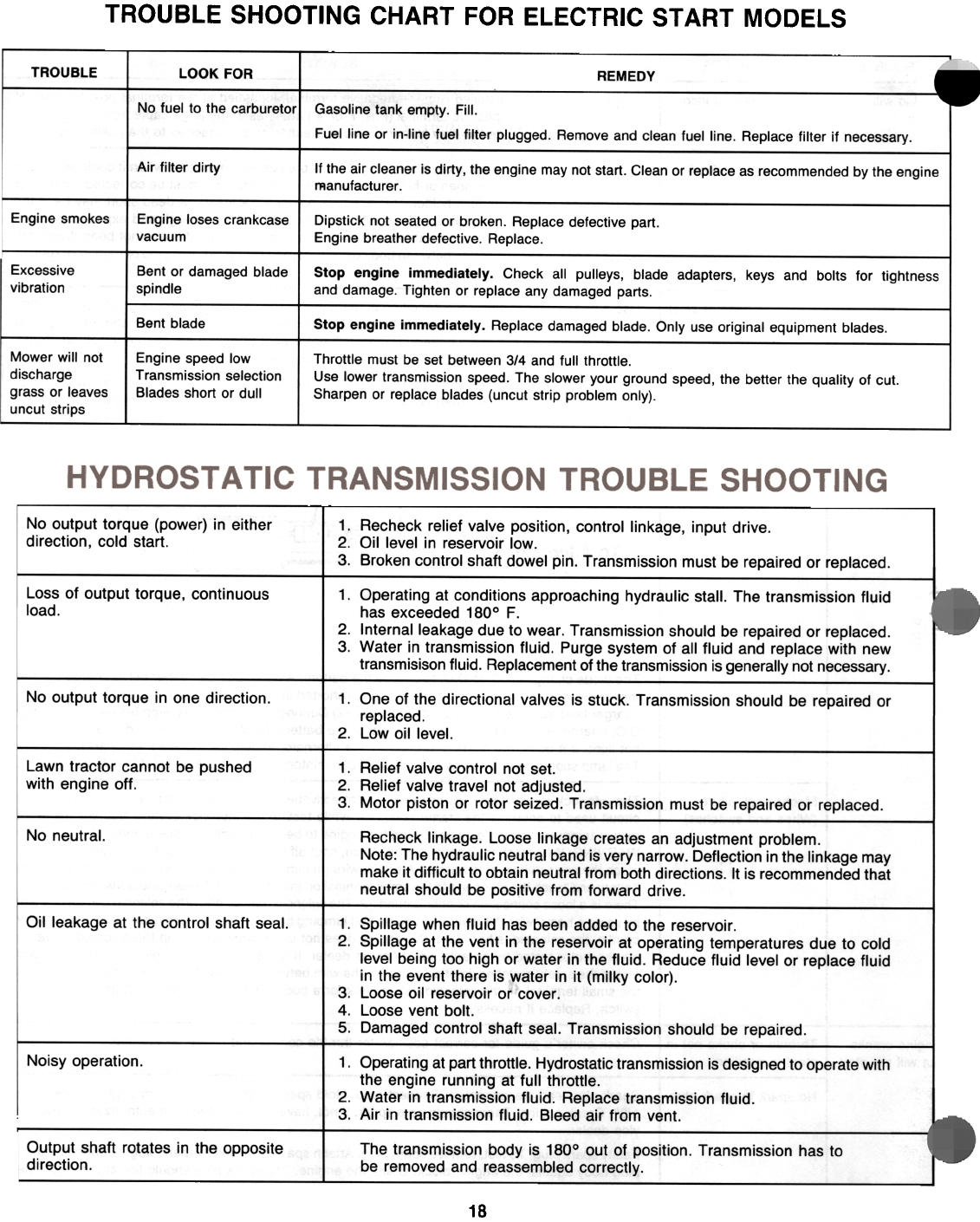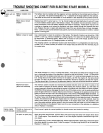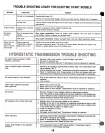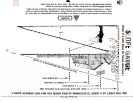
TROUBLE
SHOOTING CHART FOR ELECTRIC START MODELS
TROUBLE
LOOK FOR
REMEDY
No fuel to the carburetor!
Gasoline tank empty. Fill.
Fuel line or in-line fuel filter plugged. Remove and clean fuel line. Replace filter if necessary.
Air filter dirty
If the air cleaner is dirty, the engine may not start. Clean or replace as recommended by the engine
rRanufacturer.
Engine smokes
Engine loses crankcase
vacuum
Dipstick not seated or broken. Replace defective part.
Engine breather defective. Replace.
Excessive
vibration
Bent or damaged blade
spindle
Stop engine immediately. Check all pulleys, blade adapters, keys and bolts for tightness
and damage. Tighten or replace any damaged parts.
Bent blade
Stop engine immediately. Replace damaged blade. Only use original equipment blades.
Mower will not
discharge
grass or leaves
uncut strips
Engine speed low
Transmission selection
Blades short or dull
Throttle must be set between 3/4 and full throttle.
Use lower transmission speed. The slower your ground speed, the better the quality of cut.
Sharpen or replace blades (uncut strip problem only).
No output torque (power) in eitherdirection,
cold start.
1. Recheck relief valve position, control linkage, input drive.2.
Oil level in reservoir low.
3. Broken control shaft dowel pin. Transmission must be repaired or replaced.
Loss of output torque, continuous
load.
1. Operating at conditions approaching hydraulic stall. The transmission fluid
has exceeded 1800 F.
2. Internal leakage due to wear. Transmission should be repaired or replaced.
3. Water in transmission fluid. Purge system of all fluid and replace with new
transmisison fluid. Replacement of the transmission is generally not necessary.
No output torque in one direction.
1. One of the directional valves is stuck. Transmission should be repaired or
replaced.
2. Low oil level.
Lawn tractor cannot be pushed
with engine off.
1. Relief valve control not set.
2. Relief valve travel not adjusted.3.
Motor piston or rotor seized. Transmission must be repaired or replaced.
No neutral.
Recheck linkage. Loose linkage creates an adjustment problem.
Note: The hydraulic neutral band is very narrow. Deflection in the linkage may
make it difficult to obtain neutral from both directions. It is recommended that
neutral should be positive from forward drive.
Oil leakage at the control shaft seal.
1. Spillage when fluid has been added to the reservoir.
2. Spillage at the vent in the reservoir at operating temperatures due to cold
level being too high or water in the fluid. Reduce fluid level or replace fluid
in the event there is water in it (milky color).3.
Loose oil reservoir or cover.4.
Loose vent bolt.5.
Damaged control shaft seal. Transmission should be repaired.
Noisy operation.
1. Operating at part throttle. Hydrostatic transmission is designed to operate with
the engine running at full throttle.2.
Water in transmission fluid. Replace transmission fluid.
3. Air in transmission fluid. Bleed air from vent.
Output shaft rotates in the opposite
direction.
The transmission body is 1800 out of position. Transmission has to
be removed and reassembled correctly.
18


















